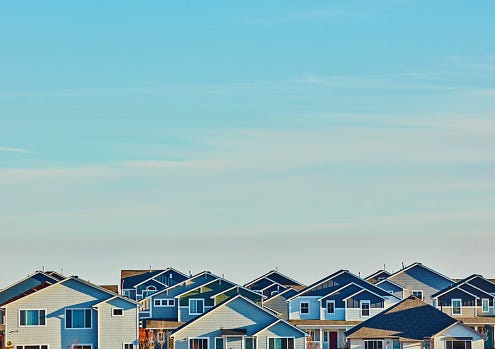In America, there’s no better feeling of economic security and establishing roots than when you’ve fully paid off your property and finally own something tangible no one can claim as theirs.
No bank or neighbor. It’s in your name.
This usually comes in the form of owning some kind of real estate, commercial, multi-family, or residential.
Owning any physical asset including real estate, artwork, farmland, or even wine, outside of liabilities such as a car which immediately depreciates in value the moment you drive it off the lot, can become a compounding machine over time as long as you’re patient enough.
Although real estate is down almost 6% from 2022, it’s up almost 40% since its peak days of the pandemic! No immediate gains deliver overnight.
According to the recommended housing rule, if you plan on holding onto your property for more than 5 years, it’s worth it to buy. Otherwise, you’re better off renting due to time and energy sake. After all, the more you own, the more it owns you!
If you can promise yourself you’ll hold onto your property for more than 5 years, down the road, that’ll do wonders to your net-worth figure and you’ll likely want to become a more involved real estate investor afterwards through REITs, commercial properties, crowdfunding or converting some of those properties into rentals.
This is one of the main reasons why physical real estate is one of, if not, my favorite asset class of all time. From the safeguarded comfort to its utility factor, rising rents, and less volatility compared to public equities overall, real estate will forever be in demand in some capacity as long as there’s room for it!
Although the average home price has been swaying back and forth, currently ticking up causing angst among potential first-time homebuyers in the U.S., now as foreigners from across the globe are swooping in to buy real hard assets and convert their funny money into real hard cash, this is becoming an even more crowded market for Americans who’ve been scrolling Zillow for a while now waiting for their chance as mortgage rates have dipped.
However if there’s anything we should keep in mind when it comes to real estate in America it’s that competition is fierce. It may not feel like it but one of the main attractions of American real estate to foreigners is the buying power, appreciable return, and believe it or not, the overall lower prices for Canadaians and Asians. In the U.S., your capital is safeguarded in real estate and cannot get bought out/confiscated by an authoritarian regime.
With that being said, it seems like there’s no greater opportunity than nowadays to scoop up American real estate as flexible work, pandemic puppies, and the gig economy are fueling buyer demand. The real test on how supply and demand will turn out will be during the peak buying days towards the spring.

Mere 6% Down
Although the 15 and 30-yr fixed-rate mortgage have come off their highs since the start of this year and are now at more abated levels which were recorded back in Sep of 2022, mortgage rates are still considerably high, with the 30-yr hovering around 6–7%. Clearly with a tight hot labor market with almost 3x as many job openings as anticipated, the Fed’s job isn’t done and investors should expect more hikes on the horizon. At least recessionary fears have cooled considerably since last year due to record low unemployemnt and a resilient job market which are opposite indicators for a brewing recession.
On the housing market front, higher costs signal healthier inventory levels and less demand overall however every property down to the location is unique and depending on the seller’s eagerness to get their listing off the market, particularly during the winter when deals may be hiding in plain sight, so it’s never a bad idea to keep searching even when you’re convinced nothing reasonable is out there.
It’s staggering to read from the National Association of Realtors that 6% was the average mortgage down payment put down by first-time homebuyers in 2022. The recommended cash deposit on a home is always 20% in order to protect the buyer from financial hardship in case they lose their job or other vital income sources that keep them afloat and cannot end up paying their mortgage off.
Something will eventually come up and we must be prepared before it happens!
Since the 2008 crisis, more regulated financial precautions, lending standards, background checks, and credit report measures were put into place to prevent the GFC from resurfacing all over again so to hear that Americans are putting a mere 6% down on a home is beyond concerning.
On top of this report, it’s surprisingly disappointing to hear Americans have slashed through their pandemic fueled savings at this point. Given the heighted uncertainty around lockdowns when covid first broke, this led Americans to ramp up savings to record levels. We’re talking around 50% of take home pay and now it’s plummeted donw to close to 3% in a matter of years! Revenge spending is real but so is frightened savings.
Clearly this indicates two things about consumers:
-Americans don’t know how to control and forecast their savings/spending levels appropriately since according to economic data, these two activities are highly correlated to micro/macro trends at the time i.e. impeding recession, current mortgage rates, steeper borrowing costs, lockdowns and of course emotions, an unhealthy indicator in itself
On the flip side…
-Americans are better off than we initially projected or at least what the media tells us since being able to ramp up savings and bring it down no time can only be achieved by those who are truly financially independent and flexible. You have to know what to give up and take on and be extremely financially independent to do so. We can thank the entrepreneurial wave for this!
Since the staggering 6% figure only represents the down payment placed among first-time homebuyers, I’m not as concerned due to their time horizon. Older generations on the other hand should be able to put more down almost half or pay fully in cash due to longevity concerns and less time to recoup the losses, expenses, costs, etc.

Gaining Ground
Currently, the FOMO to own a piece of real estate is more fierce than ever and I get it. Whether it be a physical property or through buying a sliver of properties across the country in the form of shares via real estate crowdfunding, it’s a hot asset that won’t go out of style unless you bite more than you can chew which can then lead to regret and financial hassle later on.
When looking at 6% as a down-payment figure, it’s far too uncommon for foreign investors to stick to. Majority of the time, they tend to buy properties fully in cash to not deal with the mortgage and convert as much of their cash in USD away from overseas. Whether they live in them fully or not is up to them. You can tell who the buyers of luxury real estate are by noticing if they’re vacant or not.
No matter what category you’re in as a homebuyer, first-timer or long-time foreign investor, if you’re leasing out your property, that’s the ultimate win as your renter will be able to pay off your mortgage and you’ll eventally be earning supplmental income you can live off of.
Just be aware, rental income or owning a home isn’t completely passive and instead takes considerable due-diligence, time, effort, discipline, even with a property manager to manage, however, anything which requires hard work, sweat and tears is sweeter down the road, especially if you can sell it for a juicy profit.

